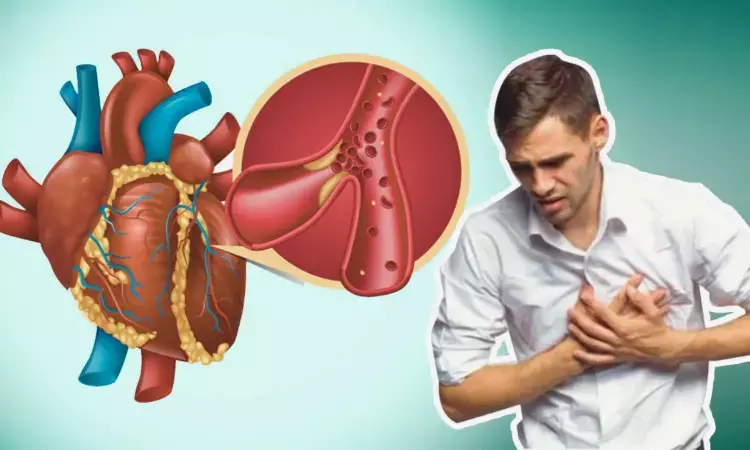- Home
- Medical news & Guidelines
- Anesthesiology
- Cardiology and CTVS
- Critical Care
- Dentistry
- Dermatology
- Diabetes and Endocrinology
- ENT
- Gastroenterology
- Medicine
- Nephrology
- Neurology
- Obstretics-Gynaecology
- Oncology
- Ophthalmology
- Orthopaedics
- Pediatrics-Neonatology
- Psychiatry
- Pulmonology
- Radiology
- Surgery
- Urology
- Laboratory Medicine
- Diet
- Nursing
- Paramedical
- Physiotherapy
- Health news
- Fact Check
- Bone Health Fact Check
- Brain Health Fact Check
- Cancer Related Fact Check
- Child Care Fact Check
- Dental and oral health fact check
- Diabetes and metabolic health fact check
- Diet and Nutrition Fact Check
- Eye and ENT Care Fact Check
- Fitness fact check
- Gut health fact check
- Heart health fact check
- Kidney health fact check
- Medical education fact check
- Men's health fact check
- Respiratory fact check
- Skin and hair care fact check
- Vaccine and Immunization fact check
- Women's health fact check
- AYUSH
- State News
- Andaman and Nicobar Islands
- Andhra Pradesh
- Arunachal Pradesh
- Assam
- Bihar
- Chandigarh
- Chattisgarh
- Dadra and Nagar Haveli
- Daman and Diu
- Delhi
- Goa
- Gujarat
- Haryana
- Himachal Pradesh
- Jammu & Kashmir
- Jharkhand
- Karnataka
- Kerala
- Ladakh
- Lakshadweep
- Madhya Pradesh
- Maharashtra
- Manipur
- Meghalaya
- Mizoram
- Nagaland
- Odisha
- Puducherry
- Punjab
- Rajasthan
- Sikkim
- Tamil Nadu
- Telangana
- Tripura
- Uttar Pradesh
- Uttrakhand
- West Bengal
- Medical Education
- Industry
Elevated Plasma Progranulin Levels Linked to Improved Heart Function Recovery After AMI: Study Finds

Japan: New research suggests that elevated plasma progranulin levels in the acute phase of acute myocardial infarction (AMI) could be a valuable predictor of recovery for heart function in the chronic phase. The findings, published in PLOS One, offer promising insights into how plasma progranulin may signal the extent of heart tissue damage during a heart attack and play a key role in the healing process afterward.
Acute myocardial infarction, commonly known as a heart attack, occurs when blood flow to a part of the heart muscle is blocked, often by a blood clot. This disruption leads to cell death and tissue damage, significantly impairing the ability of the heart to pump blood effectively. One of the key long-term concerns for heart attack survivors is the recovery of left ventricular function—the heart's primary pumping chamber. Poor recovery can lead to heart failure, a chronic condition that severely impacts quality of life.
Progranulin is a secreted glycoprotein involved in regulating inflammation and tissue repair. However, the role of plasma progranulin levels during the acute phase and their clinical significance in patients with AMI are still not fully understood. To fill this knowledge gap, Shinya Minatoguchi, Department of Cardiology, Gifu Municipal Hospital, Gifu, Japan, and colleagues aimed to explore the relationship between elevated plasma progranulin levels in the acute phase and the recovery of left ventricular function in the chronic phase of patients with acute myocardial infarction.
For this purpose, the researchers conducted a six-month follow-up study involving 18 patients with acute myocardial infarction. Blood samples were collected from the antecubital vein on day 0 (admission) and day 7 during the acute phase. A control group of 16 patients without significant coronary artery stenosis, as confirmed by cardiac catheterization, was also included.
Plasma progranulin levels were measured using an enzyme-linked immunosorbent assay (ELISA). To assess left ventricular function, echocardiography was performed in both the acute phase (within 7 days) and the chronic phase (6 months post-AMI). Left ventricular ejection fraction was evaluated using the modified Simpson’s method.
The study led to the following findings:
- Plasma progranulin levels on day 0 in the AMI group (69.5 ± 24.6 ng/mL) were comparable to those in the control group (84.2 ± 47.1 ng/mL).
- A significant increase in progranulin levels was observed in the AMI group on day 7 (104.2 ± 52.0 ng/mL) compared to day 0.
- The rise in plasma progranulin levels during the acute phase was positively correlated with improvements in left ventricular ejection fraction between the acute and chronic phases.
- Of all factors analyzed, only plasma progranulin levels were positively correlated with left ventricular functional recovery in the chronic phase.
"We demonstrated that plasma progranulin levels rise during the acute phase following acute myocardial infarction and that this increase is positively associated with improvements in left ventricular ejection fraction during the chronic phase. The elevation in plasma progranulin levels may play a role in enhancing left ventricular function recovery over time," the researchers wrote.
"This suggests that acute-phase plasma progranulin levels could serve as a predictive biomarker for chronic-phase left ventricular functional recovery in AMI patients," they concluded.
Reference:
Minatoguchi, S., Satake, A., Murase, H., Yoshizumi, R., Komaki, H., Baba, S., Yasuda, S., Ojio, S., Tanaka, T., Okura, H., & Minatoguchi, S. (2024). Elevated plasma progranulin levels in the acute phase are correlated with recovery of left ventricular function in the chronic phase in patients with acute myocardial infarction. PLOS ONE, 19(11), e0313014. https://doi.org/10.1371/journal.pone.0313014
Dr Kamal Kant Kohli-MBBS, DTCD- a chest specialist with more than 30 years of practice and a flair for writing clinical articles, Dr Kamal Kant Kohli joined Medical Dialogues as a Chief Editor of Medical News. Besides writing articles, as an editor, he proofreads and verifies all the medical content published on Medical Dialogues including those coming from journals, studies,medical conferences,guidelines etc. Email: drkohli@medicaldialogues.in. Contact no. 011-43720751


